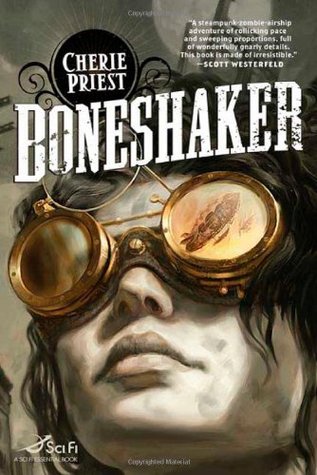Boneshaker {Sci-Fi Novel Annotation}

 Title: Boneshaker
Title: BoneshakerSeries: Clockwork Century
Author: Cherie Priest
Publisher: TorBooks
Publication Date: September 2009
Page Count: 416
Genre: Science Fiction, Steampunk
Time Period: 1880s
Location: Seattle, Washington (Alternate Historical)

In an alternate historical 1860's Seattle, Leviticus Blue, an inventor, built a commissioned machine to drill through the ice in search of gold. Something went terribly wrong in 1863 and the Boneshaker tore from Blue's basement, wreaking havoc on the city before returning home again. Not only did the Boneshaker destroy the land, it also released a deadly gas, Blight, that will either kill the person who breathes it in or turn them into a "rotter" (aka, zombie). The city was evacuated and a 2-square-mile, 200-foot-high wall was erected to contain the gas. Sixteen years later, his widow, Briar, has been trying unsuccessfully to live down the life that Blue has left her with - the shame and guilt of having destroyed a city. With little to no money, she has been raising Ezekiel, often called Zeke, since the last day they worked on the wall and she has told him next to nothing about him his father. When Briar finds out that Zeke is determined to revisit the family history and redeem the family by finding his way into the old walled-off city, she has no choice but to follow him. Between the Rotters and the Blight, can she pull off a simple, quick rescue? Will she make it time to reunite with Zeke?

Inventors
Motherhood
Rescues
Zombies
Motherhood
Rescues
Zombies

Courageous
Flawed
Strong female
Flawed
Strong female
Pacing
Fast-Paced
Storyline
Intricately plotted
World-building
World-building
Tone
Atmospheric
Suspenseful
Suspenseful
Writing Style
Compelling
Richly detailed
Richly detailed
Storyline - In Science Fiction, story is the key. The goal is for the author to create a captivating tale that will keep readers engaged and invested through the end, while at the same time pondering complex questions and philosophical issues. Priest does a fairly decent job at this. After the Boneshaker tore through the town, everyone, including Briar, is left wondering if Leviticus did it on purpose. Did he release the gas on the city? Did he tear up the town? Did he rob the banks? Did Briar know? And where did he go? There are so many things left unknown after the incident.
Frame/Setting - As Saricks states, "World-building - the formation of a vividly created and detailed setting - is as key in this genre as it is in the Landscape genres of Fantasy, Historical Fiction, and Westerns" (97). Priest masters this in Boneshaker. She managed to transport me to a time and a place that I clearly had never been. When writing this novel she took some liberties (as she stated in her Authors Note at the end of the book) with what Seattle looked like at the time, but I felt as if I were there with Briar and company walking the dilapidated streets of 1880 Seattle, searching for Zeke, fighting with a scratchy mask on my face.
Language/Style - The writing style in science fiction largely depends on the author and the sub-genre in which they are writing. In Priest's case, she told the story from two separate viewpoints - Briar's and Zeke's with vivid detail. I felt Briar's strong female come through and Zeke's tough and scared teenage self shine from the pages.
Tone - Tone within the pages of a SF novel matters greatly and forces the reader outside their comfort zone. "The tone of a given work reinforces the point of SF in general to confront and grapple with what it means to be human, the responsibilities and consequences of exploration, and the universality of the alien" (Saricks 98). Without tone you wouldn't have a SF novel.
Characterization - I loved most of the characters in this book and I'm fairly certain I hated the appropriate characters. While SF does mostly focus on ideas and setting and not building up characters, the characters that are featured are fairly well thought out and not flat. Briar is a strong, kick-ass woman who cares deeply about her son but also about the people she meets along the way. Zeke is a young man who is learning to trust himself in a world full of strangers but definitely doesn't know who to trust to help him along the way.
Pacing - Once the action started going in this book I felt like it never stopped. I'm sure there could be arguments made for pros and cons for that, but I really enjoyed that it basically kept going non-stop through the end.

Based on Saricks' "Characteristics of Science Fiction" (94), Boneshaker hits pretty much all six points made:
- Priest explores some "moral, social, intellectual, philosophical, and ethical questions against a setting outside everyday reality". Between the Boneshaker tearing through the town and its aftermath (as mentioned above) and what Briar finds in the town when she arrives to rescue her son (no spoilers), there are definitely questions and topics raised here.
- The setting is definitely crucial in Boneshaker. It clearly "invokes otherness of time, place, and reality" by transporting you to a walled Seattle in the 1880's that's filled with a toxic gas that will either kill you or turn you into a rotter if you're not wearing the proper protection.
- Priest does a good job of choosing the proper language to "suit the story line and to reinforce the intellectual and speculative nature of the genre."
- The tone was mostly suspenseful and atmospheric, but there were some lighter moments when we got to see some joking going on and moments that allowed for character building.
- The rotters were definitely used to underscore the otherness in this case. There were some other characters that were used to underscore some of the other issues as well.
- This was more of of an action-packed and adventure-filled story so the novel was fairly fast-paced.


Both steampunk novels have intricately plotted storylines told in a compelling writing style. They also have suspenseful tones with strong women.

Both of these suspenseful steampunk novels feature strong women and are set in the Pacific Northwest in the late 1880s.

These fast-paced steampunk novels are both suspenseful, compelling stories that will keep you turning the pages until the end.

BookBrowse. "Book Reviews: Find the Best New Books." BookBrowse.com, www.bookbrowse.com/index.cfm.
"Meet Your Next Favorite Book." Goodreads, Goodreads, www.goodreads.com/.
NoveList | EBSCOhost. www.ebscohost.com/novelist.
Saricks, Joyce G., and Neal Wyatt. The Readers Advisory Guide to Genre Fiction. ALA Editions, An Imprint of the American Library Association, 2019.
"Meet Your Next Favorite Book." Goodreads, Goodreads, www.goodreads.com/.
NoveList | EBSCOhost. www.ebscohost.com/novelist.
Saricks, Joyce G., and Neal Wyatt. The Readers Advisory Guide to Genre Fiction. ALA Editions, An Imprint of the American Library Association, 2019.

Hi, Brandy! I loved "Boneshaker" when I read it, and you touch on the vivid creations of Cherie Priest just I found them--I do appreciate the believable narrators, too; what I liked in particular was that many of the secondary characters were also strong women (and different from one another!); in that year I also read Neil Gaiman's "Neverwhere", which features several strong women, too, and I thought they had a similar dark/comic tone (Saricks 94), if vastly different narrators. What a sense of place! I think Neil Gaiman's novel is more accurately described as urban fantasy, but I guess there is some crossover?
ReplyDeleteI definitely felt as if she constructed very different characters, for sure, which I appreciated. It was very easy to differentiate among them and they all had their own strengths and weaknesses. It was great.
DeleteI've had Gaiman's Neverwhere on my list for sometime but haven't gotten around to it. I imagine there's crossover everywhere, to be fair. I haven't read much of his, but I have looked forward to this one for a while.
I like that the book is sci-fi, but also zombies? It seems like a good transition book for those whom are trying to get out of their comfort zone and test out another genre. However, I never really got into the whole steampunk thing. Its like they moved forward with technology but not with the mechanics, and i find that hard to believe. How can one develop and not the other? However, that is just my own personal standpoint on it. The book does sound interesting though. The zombies intrigue me. I will have to add it to my list.
ReplyDeleteI remember the first steampunk book I read - Ticker, by Lisa Manchev - and thinking the same thing, but I really ended up enjoying it. I don't know that it's something I could read *all the time* or *only*, but for an every now and again read, it's enjoyable. I think, as with every other novel on earth, as long as it's written well/right, anything can be believable. ;)
DeleteHi Brandy,
ReplyDeleteI have not read a lot of science fiction, but oddly, I am a fan of science fiction shows and films. I binge-watched Phillip K. Dick's The Man in the High Castle, and enjoy 1950's "B" sci-fi films like Invasion of the Body Snatchers. I am a little more familiar with YA dystopian and steampunk novels. Are dystopian books considered sci-fi? Even though I don't search for Science Fiction for my personal reading, I agree with your comment above that if a book is well-written, it can be an entertaining change from my usual choices. It's fun to dare myself to try something different. I have been surprised many times! Now I know if a staff member, friend, or patron is particularly enthusiastic about a book, it's probably worth giving it a try.
Yes! I often find the more enthusiastic someone is about a book the more it is worth a try. I do find i less "attracted" to sci fi set in space, but that doesn't mean I won't try it. Lol
DeleteAnd yes, according to Saricks, dystopian is considered sci-fi.
DeleteHello Brandy,
ReplyDeletehaving also read this, I feel that is very much a SF novel without being the stereotypical space setting. I would say that the weakest part of this story for me was the plot line. I felt that it took to long to get going and then once it started it ended too soon. That being said I really enjoyed the different characters and how they were portrayed. I would also note that the world building is spot on making up for much of what I felt was lacking in story. Did you end up enjoying it in the end?
Zack
It was a bit slow going in the beginning, but I felt that was on purpose in order to build the world she wanted to immerse her readers in. She wanted to make sure that we understood what Leviticus had left behind with his Boneshaker and the turmoil that Briar and Zeke felt and the state of Seattle and Of and struggle they felt. How the Blight not only affected the walled city but those outside the wall as well as those who left the city 15ish years ago. If we weren't able to see all of that and the struggle between Briar and Zeke, and what Zeke wanted to find, why would we care what Zeke did and subsequently what Briar did? (BTW, this is *really* hard to do without spoilers on behalf of others who may not read the book! Haha!!!) Email/talk later? :)
DeleteYou did an EXCELLENT job on this annotation. You really demonstrated the elements of the genre and the appeals without giving too much away and making it sound super interesting. I haven't read as much steampunk as of yet, but I will have to move this higher up on my tbr list. Full points!!!
ReplyDeleteYay! I mostly enjoyed this one... I hope you do, too, when you get to it!
Delete